SMALLWOOD, N.Y. — About 115 miles northwest of Staten Island, in a quaint hamlet in the town of Bethel, New York, Brian Moffett waits patiently.
First, for his morning shower.
Then for breakfast: a cinnamon raisin bagel, his favorite.
Moffett waits to be dressed for the day, waits for his medication to be administered and waits for family and old friends to tour the property he bought a decade ago but has called home for the past two.
The wait has become inevitable for the longtime Staten Island resident now that amyotrophic lateral sclerosis (ALS) has him firmly in its grip.
Although symptoms of this incurable, progressive motor neuron disease began around the time of his retirement two years ago, the once proudly independent 66-year-old was not officially diagnosed until about three months ago.
Over the next 12 weeks, Moffett lost almost all mobility except for some neck and facial movement and some dexterity in one hand. He cannot walk and is in constant pain. His speech is choppy, slurred and punctuated by labored breathing.
Moffett relies on extensive and expensive home care, provided around the clock by his adult son, Jake, his cousin Joe Arbeeny and attentive caregivers, all of whom bathe, dress, move and feed him.
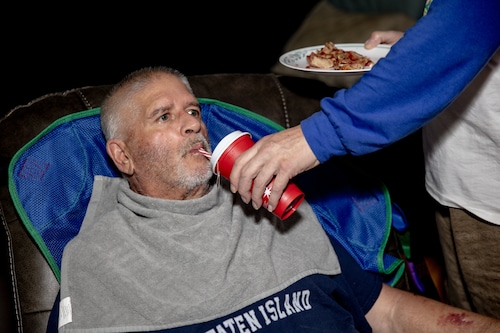
Brian Moffett is served pieces of cinnamon raisin bagel by his cousin, Joe Arbeeny, between sips of water. (Staten Island Advance/Jason Paderon)Jason Paderon
Moffett will be the first to tell you: he didn’t have to live the rest of his life this way.
He could have died on his own terms if New York’s medical aid in dying (MAiD) law had garnered enough support to pass the state Legislature this year, and if Gov. Kathy Hochul had signed it.
The law would have allowed mentally competent people with a terminal illness, over the age of 18 and with less than six months to live to choose to self-administer prescribed medication to end their lives.
Convinced of its qualities, Moffett wanted to be the first in the state to use it and hoped to be able to use it on August 1, his 67th birthday.
Instead, the measure, which was first introduced by former Staten Island Sen. Diane Savino in 2015 and currently counts current Staten Island Sen. Jessica Scarcella-Spanton as its lead co-sponsor, has failed to advance for the fifth consecutive legislative session. No version of the bill has ever come to a vote in the state Senate or Assembly.
Lawmakers will have to wait until January 2025, when the new session begins, to reintroduce it. That’s an impossible deadline for New Yorkers like Moffett who have no time to waste.
Moffett didn’t want to experience what his terminal illness had in store for him.
Now it seems he must wait for the inevitable.
Day by day
A hospital bed, where Moffett spends most of his time, sits in the center of his living room, facing a giant television mounted on the wall. Nearby are a wheelchair, a battery-powered recliner and Moffett’s beloved 10-year-old dog, Shelly, who is never far away. Sliding doors let sunlight and fresh air in. A dry vacuum machine that helps clear phlegm from his mouth rumbles loudly behind him.
“Bed. Chair. Bed,” Moffett, who recently hosted Advance/SILive.com in his home, said of his daily routine.
“I can’t move. I can’t scratch my face with my hand. Everything is hard. Every day, life is really hard.”
The quality of life, Moffett said, is “worse than it was the day before.”
“I can’t do anything by myself. Nothing. For everything I do, I need help. I still have my sight, but my muscles are all weakened.”
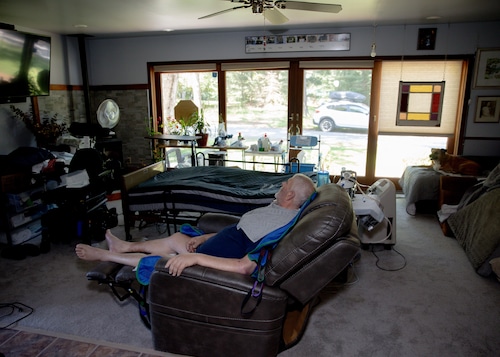
Brian Moffett sits in his recliner, facing the television. Except for some movement of his neck, face and hands, he has lost almost all mobility. (Staten Island Advance/Jason Paderon)Jason Paderon
Between sentences, Moffett pauses and then wheezes. The muscles in his chest and abdomen, so affected by the disease, no longer contract as they should. He is unable to expel the mucus that obstructs his airways.
“ALS is killing me. It’s a slow-moving disease and I don’t want to suffer. Every day I’m here, I suffer. It’s very depressing.”

Brian Moffett’s dog Shelly is never far away. (Staten Island Advance/Jason Paderon)Jason Paderon
His message to legislators: “I want this law to be adopted”
Currently, only 10 states – Oregon, Washington, Vermont, California, Colorado, Hawaii, New Jersey, Maine, New Mexico and Montana – and Washington, D.C., allow medical assistance in dying in the United States.
The Delaware state legislature narrowly passed the End-of-Life Options Act on June 25; the bill still awaits Gov. John Carney’s signature.
Although he was previously considered too medically compromised to relocate, Moffett still plans to attempt to leave his home state of New York — no matter how much pressure it would surely place on him — to take advantage of a neighboring state’s medical aid-in-dying law.
But his time may be running out. According to the ALS Association, the average survival time for a person with the disease is three years. While it’s possible Moffett could live longer than that (about 20 percent of people with ALS live five years, 10 percent live 10 years, and 5 percent live 20 years or more), it’s unclear when he’ll lose his ability to speak and what little function he has left in his hand. His mind remains sharp, but his body is deteriorating rapidly.
The conditions for access to medical assistance in dying are rigorous in all areas. Among the many prerequisites for obtaining medical assistance in dying is the ability of a terminally ill person to verbally request the medication that ends their life and to administer it to themselves.
That realization is a source of anxiety for Moffett, who has become one of many advocates, like Daren and Amy Eilert, calling for the passage of MAiD in New York. The Eilerts’ daughter, Ayla, a 24-year-old Manhattan resident, died in excruciating pain from terminal cancer less than seven months after her diagnosis. Ayla repeatedly asked for relief in the form of medical assistance in dying, according to her parents.
Moffett understands that he probably won’t be able to get New York state to pass its own assisted-dying law. That won’t stop him from trying.
“Let’s change that for people like me,” Moffett said.
“I’m not talking about someone who just wants to die. I’m talking about really sick people who don’t want to go through this.
“Every day I will suffer. From today, from tomorrow, until I die. … this law, I want it to be voted.”
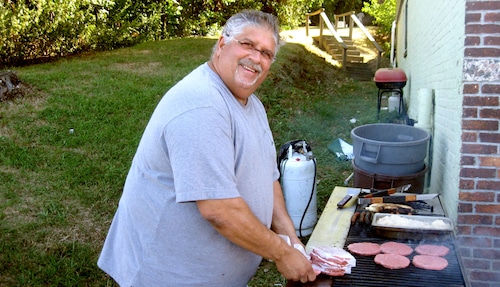
Brian Moffett, nearly 15 years ago. A longtime Staten Islander, he was known around the borough as the “Grill Master.” (Staten Island Advance/Virginia N. Sherry)Staten Island Advance/Virginia N. Sherry
Pieces of Staten Island
Amid calendars and whiteboards with medication schedules and doctor’s visit reminders, Staten Island memorabilia adorns the walls and spaces in between.
A framed menu from the Westerleigh Folk Festival hangs in the kitchen of the 25-year-old retired MTA employee’s one-story complex, as he calls it; Moffett, also known as the “Grill Master,” was one of the event’s founders.

A menu from the Westerleigh Folk Festival, also known as West Fest, hangs on the wall in Brian Moffett’s kitchen. For years, Brian has been involved in community events. (Staten Island Advance/Jason Paderon)Jason Paderon
A street sign reading Roberta “Bobbie” Jacobowitz Way, commemorating the late North Shore activist (her former mother-in-law), hangs near her entrance. The original hangs at the intersection of St. Marks Place and Hyatt Street in St. George.
In a mirrored glass case, among New York Jets and Mets memorabilia, are Moffett’s various knickknacks that reflect the 60-plus years he’s lived in the borough between West Brighton and Westerleigh, and his favorite photo of him and Jake, taken decades ago.
A giant, working phone booth sits in a corner of the living room. Moffett had it shipped from his former home, the Island Swim Club in New Springville, before the club was demolished in the early 2010s.
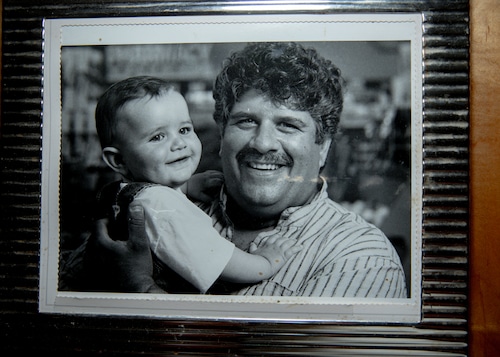
Brian Moffett’s favorite photo is one he took nearly 30 years ago, with his infant son, Jake. (Staten Island Advance/Jason Paderon)Jason Paderon
Outside, old manhole covers from New York City streets serve as a stepping stone to Moffett’s workshop, where a vintage Clove Road clock sits. His five barbecues, which have brought so much joy to so many, are split between an open-air warehouse and a tent on the property.
Each object is a reminder of what he loves.
Everything is at rest now.
His “right to die”
ALS robbed Moffett of the ability to move and live freely, but it won’t erase his memories: of playing football and baseball near his childhood home on Taylor Street in West Brighton; of making dear friends at PS 19, IS 27 and Ralph R. McKee High School; of enjoying Staten Island’s beaches and parks, especially High Rock Park; or of spending time with his buddies as an adult in the bars of Forest Avenue.
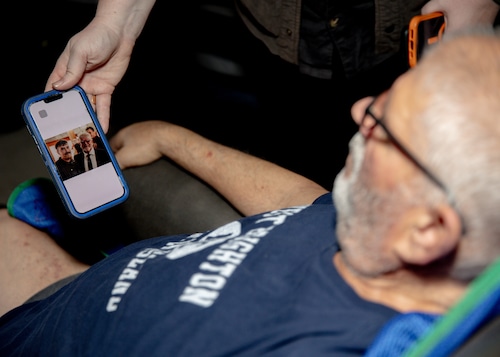
Brian Moffett looks at a photo taken last fall of himself and Jake at his wedding. (Staten Island Advance/Jason Paderon)Jason Paderon
This will not take away from the unbreakable bonds he built in his home neighborhood and beyond, nor from his reputation as a carer, someone who often dropped everything to give his time and effort to a friend or fellow Staten Islander in need.
Nor will ALS spoil the way Moffett’s blue eyes light up when he talks about his son, Jake.
“I raised a good son,” Moffett said. “Without Jake, I probably wouldn’t have been able to do (anything). … I was blessed with a good family.”
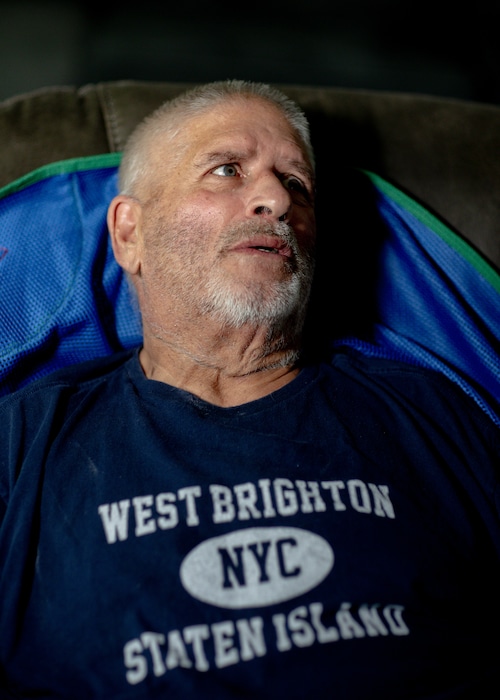
Brian Moffett wanted to be the first in New York state to use medical aid in dying. But the law didn’t pass. (Staten Island Advance/Jason Paderon)Jason Paderon
Demanding to die on his own terms weighs heavily on Moffett, especially when he remembers everything and everyone he holds dear. Yet he knows that this is what he wants to do.
Or, at least, what he would like to be able to do.
“Let me go in peace. It’s wrong to not give people like me the right to die,” Moffett said.
He urged New York lawmakers once again:
“Pass it.”
Jake Moffett launched a GoFundMe campaign to help pay for his father’s intensive medical care. To donate, visit GoFundMe.com and search for the keywords: Home Care Support for Dad with ALS.